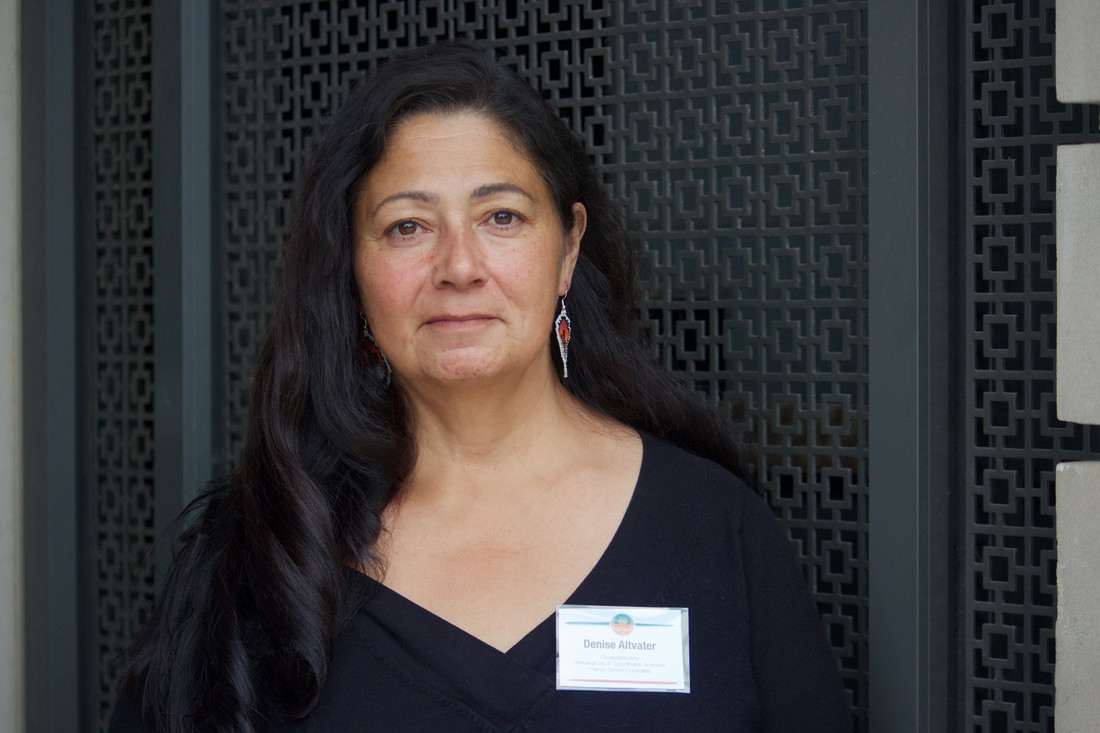
Photo: Carl Roose/AFSC
This year, we honor and celebrate Denise Altvater, who recently retired as director of AFSC’s Wabanaki Program after 29 years of service.
In a region where Native communities have historically been isolated and marginalized, Denise helped create a supportive web of connection and communication. Through the years, Denise organized and advocated for the health and welfare of Indigenous youth, for incarcerated people, and for the restoration of Indigenous culture and practices to help Native communities heal from colonial traumas.
Under Denise’s leadership, the Wabanaki Program was instrumental in organizing the first Truth and Reconciliation Commission (TRC) between a sovereign tribal nation and a U.S. state. The Maine-Wabanaki-State Child Welfare TRC was charged with uncovering and acknowledging the truth about what happened to Wabanaki families whose children were taken away by the state and placed in non-Native foster care homes. From February 2013 to June 2015, the TRC led a truth-seeking process, traveling to multiple villages and communities in Maine to hear the stories of the Wabanaki people.
At the start of the TRC, Denise said: “People can be transformed by being open and human. We believe that people have a need to be heard, but how they are heard really matters—if they take the risk of telling their story, it needs to make a difference.
“The hurts are so deep. … We need to understand how what happened impacts how we treat each other, and how we need to heal in order for things to change. There is power in having a voice.”
The TRC process created opportunities for the Wabanaki people to share their stories in a meaningful way—and find opportunities to begin to heal. It helped spur changes in the child welfare system to ensure best practices in working with Native children. And it helped Wabanaki youth better understand their history; the generational trauma they had endured; and why their communities continued to experience high rates of incarceration, suicide, and other issues.
“When we first started this process, I didn't have any idea how many people were involved and how many people would be willing to give their statements,” Denise said in 2016. “In total, we got over 80 statements in a year and a half, and we're still taking them. That was the big surprise for me.”
In the years since the TRC, the Wabanaki Program has continued to bring communities together to confront injustices and promote healing among Maine's four Wabanaki tribes. The program has provided education, training, and participatory activities using Native traditions. It has worked with Wabanaki youth and youth workers to develop their leadership skills. It has also helped Quakers and other non-Native allies understand and commit to repairing the harms caused by colonization in the U.S. These efforts have included teaching Wabanaki history and forming non-Native youth groups to start conversations about decolonization.
“If we can look honestly at the truth of the past, then we can commit to creating a more just future,” Denise has said. “We can do that by pushing through all those obstacles. That's what can make a real difference, but we really have to acknowledge and recognize the privilege and hold ourselves accountable for what happened and what is happening.”
Today, AFSC is in the midst of learning from the Wabanaki people to determine together how we can accompany their struggles for justice in the years ahead. We look forward to building on Denise’s work as an organizer and advocate for the Wabanaki people and communities in Maine.
Thank you, Denise!